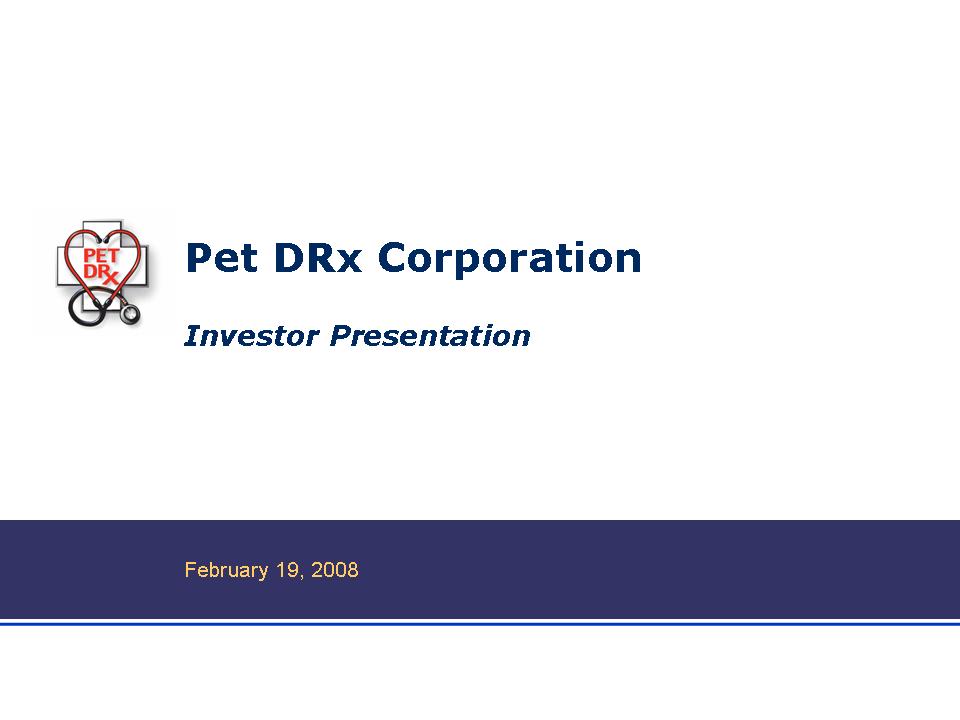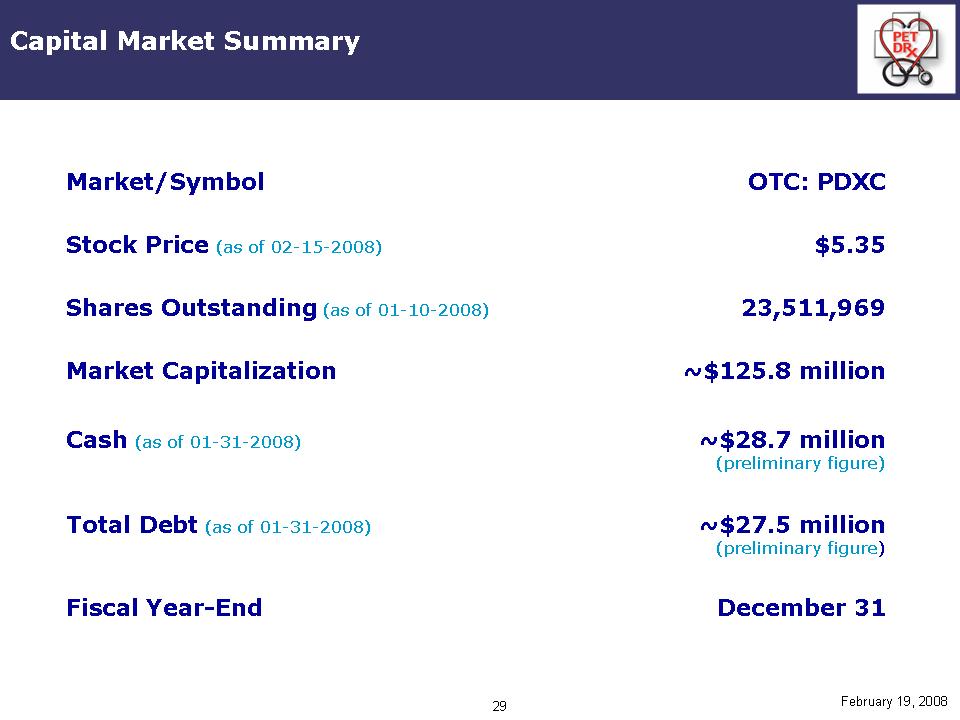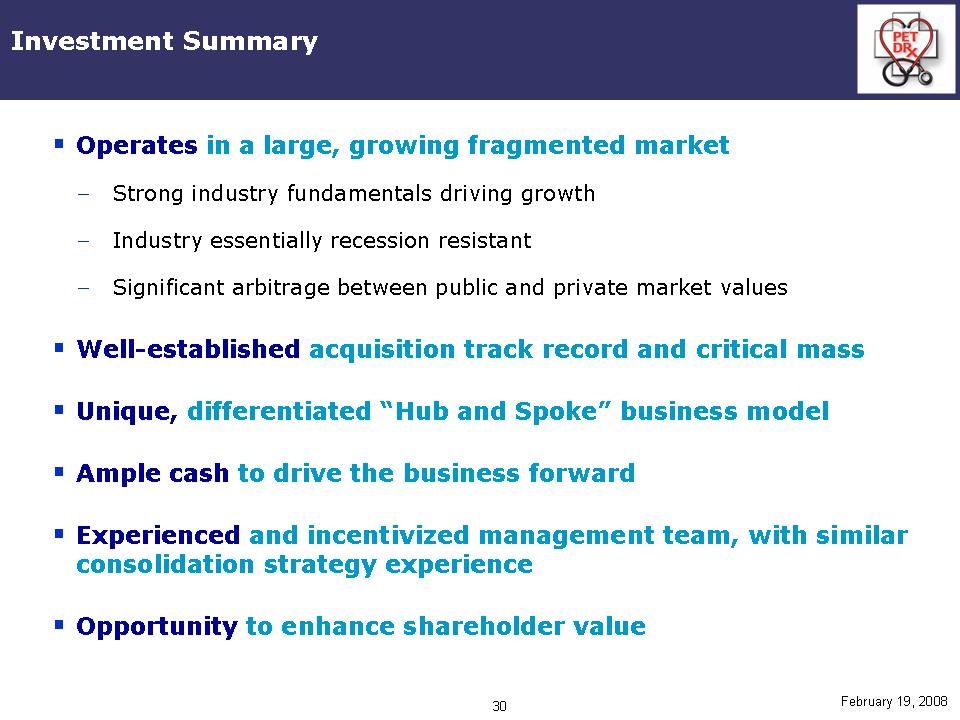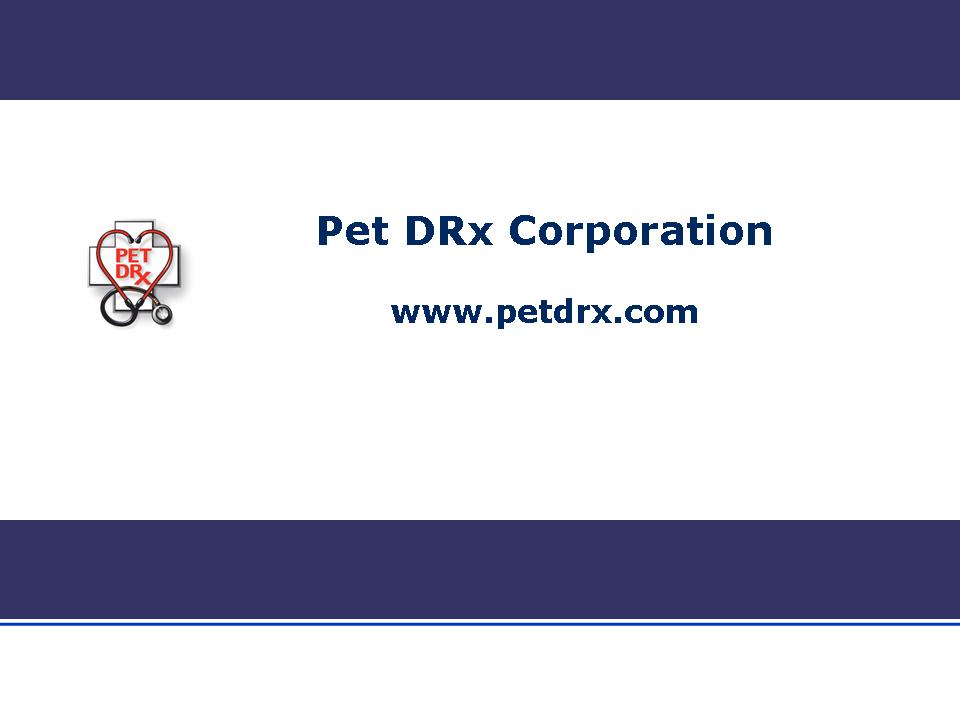Exhibit 99.1
Pet DRx Corporation
Investor Presentation
February 19, 2008

This presentation includes pro forma financial information that reflects the merger of XLNT Veterinary Care, Inc. into a wholly-owned subsidiary of Pet DRx Corporation (formerly known as Echo Healthcare Acquisition Corp.) which was completed on January 4, 2008. See the Company's Current Report on Form 8-K filed with the SEC on January 10, 2008 for additional pro forma information.
Certain matters discussed in this presentation, including statements as to the expected operations of Pet DRx Corporation following the merger with XLNT Veterinary Care, Inc., future product and service offerings, and anticipated benefits of the merger, are forward-looking statements. These forward-looking statements are subject to risks and uncertainties that may cause actual results to differ materially, including, but not limited to, the ability of the Company to successfully acquire, integrate and operate veterinary hospitals and clinics, requirements or changes affecting the businesses in which the Company is engaged, veterinary services trends, including factors affecting supply and demand, dependence on acquisitions for growth, labor and personnel relations, changing interpretations of generally accepted accounting principles and other risks detailed from time to time in the Company's SEC reports, including its Current Report on Form 8-K filed on January 10, 2008, its Registration Statement on Form S-4, as amended, filed on November 8, 2007 and all future reports on Form 10-Q and 10-K. These forward-looking statements speak only as of the date hereof. The Company disclaims any intention or obligation to update or revise any forward-looking statements.

What Is Pet DRx?
. Provider of primary and specialty veterinary care services to companion
animals through a network of fully-owned veterinary hospitals
. Currently own and operate 26 veterinary hospitals in the state of California,
with approximately 800 employees
. Full range of medical treatments:
– Preventative care:
• Vaccinations
• Examinations
• Spaying / neutering
• Dental care
– Specialized diagnostic/medical services:
• X-ray
• Ultra-sound
• Internal medicine
• Surgery
• Cardiology
• Ophthalmology
• Dermatology
• Oncology
• Neurology
February 19, 2008
2
Investment Rationale
Management experienced in similar consolidation strategies
Operates in a large, growing fragmented market
Differentiated “Hub and Spoke” business model
Ample cash to drive the business forward
Well established acquisition track record and critical mass
Strong industry fundamentals driving growth; recession resistant
Significant arbitrage between public and private market values
February 19, 2008
3

Large and Growing Market
. Several factors driving growth in veterinary healthcare
– Demographic shift that supports a growing pet population
– Increasing emphasis on pet health and wellness
– Industry has more favorable economics than human healthcare
– Medical technology previously used only on humans is migrating into animal care
– Highly fragmented industry -the top five competitors in the industry own fewer than 6% of all veterinary hospitals
Veterinary Healthcare Spending: 1991-2006
$6.9 $11.0 $18.2 $21.4 9.7% CAGR $ in billions
1991 1996 2001 2006
Source: American Veterinary Medical Association (“AVMA”) U.S. Pet Ownership &
Demographics Sourcebook (2002 Edition). 2006 estimate per APPMA 2005/2006 National Pet Owners Survey.
U.S. Household Pet Ownership
Households with at least one pet 69 million
Households with at least one dog 43 million
Households with at least one cat 38 million
Source: American Veterinary Medical Association. Source: American Pet Products Manufacturers Association, Inc.
February 19, 2008
4

Increasing Focus on Pet Health Support Spending Trends
. Increasing focus on pet wellness
– Roughly 70% of owners would pay “any amount” to save their pet’s life
– Pet ownership increased from 54% in 1994 to 63% in recent years
– Dog owning households spend almost 38% more on their dogs in 2001 than in 1996
– Spending on animal surgical visits doubled between 2000 and 2004
. Changing demographics are impacting demand for veterinary services
– The population of baby boomers will increase by 46% this decade
– Baby boomers own more pets and contribute to approximately one third of all pet care expenditures
Source: American Pet Products Manufacturers Association.
What Owners Would Pay to Save Pet’s Life
80% 60% 40% 20% -
$500 $1,000 $5,000 Any Amount
Source: Veterinary Pet Insurance Survey.
Average Annual Cost: Veterinary Surgical Visits
$800 $600 $400 $200 $-
2000 2004
Source: American Pet Products Manufacturers Association.
February 19, 2008
5

Animal Healthcare More Attractive than Human Healthcare
Payment Dynamics Government Reimbursement Collections Liability Regulatory Environment Technology Impact
Animal Healthcare
Primarily cash pay None Received at time of service; low bad debt Low liability profile; insurance premiums low
Mostly unregulated Migration of human technology to animals
Human Healthcare
Complex process of billed charges Cumbersome payment systems Potential long wait times; high bad debt
Malpractice exposure with high premiums Highly regulated by state and Federal Fairly mature technology curve
February 19, 2008
6
Fragmented Veterinary Care Industry
Number of AVMA Hospitals Top 5 Operators Comprise ˜5.5% of Hospitals
22,000 17,500
NVA, 96 VetCor, 36 Banfield, 625 VCA Antech, 424 Pet DRx, 26
˜5.5%
1991 2005
Top 5 Operators Independents
Source: American Veterinary Medical Association.
7
Source: Veterinary Survey by William Blair & Company, L.L.C.
February 19, 2008

Opportunities Associated with Consolidation
5,959 14% 18,154 41% 19,055 43% 831 2%
. 41% of veterinarians work in practices of only one or two veterinarians
– Less than 14% of veterinarians work in practices of seven or more veterinarians
. Aggregators are capitalizing on the fragmented market
– Larger providers leverage economies of scale and purchasing power
– Larger providers able to support development of new medical technology for animal care
– Vets want to minimize time on administrative tasks and focus solely on practicing medicine
– Smaller practices find it more difficult to offer new, more complex services
Source: Veterinary Survey by William Blair & Company, L.L.C.
Veterinarians per Practice*
1 or 2 vets 3 to 6 vets 7+ vets Not sure
Source: Veterinary Survey by William Blair & Company, L..L..C.
* Values imputed based on 44,000 total veterinarians and percentage mix of respondents to survey.
February 19, 2008
8

Acquisition History
Pet DRx currently owns and operates 26 veterinary hospitals in northern and southern California
2004 2005 2006 Q1 2007
2 6 20 2 4 5 6 9 - 5 10 15 20 25 30
Acquired first two hospitals on September 30, 2004
15 facility acquisitions since the Echo merger announcement
20 facility acquisitions in 12 month period between March 31, 2006 and 2007 (when the acquisition strategy was put on hold)
Prior Fiscal Year End Centers Pre-Echo Agreement Post-Echo Agreement
February 19, 2008
9
Differentiated “Hub and Spoke” Business Model
Pet DRx delivers its services through a regional “hub and spoke” system
– “Hub” is a specialty/emergency hospital providing specialized diagnostic/medical services
– “Spoke” is a traditional smaller general practice that performs primary and preventative care services
“Hub” “Spoke” “Spoke” “Spoke” “Spoke”
February 19, 2008
10
Differentiated Business Model
Creates Revenue and Margin Opportunities
Increase Revenues & Margins Proactive Marketing Cluster Strategy Enhance Doctor Productivity Economies of Scale Ancillary Products Personnel Training
. Transforms practice from “re-active” sickness-focus to “pro-active” wellness focus
. Increases visits as well as doctor productivity
February 19, 2008
11
Differentiated Business Model
Creates Revenue and Margin Opportunities
Increase Revenues & Margins Proactive Marketing Cluster Strategy Enhance Doctor Productivity Economies of Scale Ancillary Products Personnel Training
. Target markets with the “right” demographics
. Combine facilities to leverage synergies and reduce redundancies
. Allows elimination of inefficiencies due to small-scale operations
. Enables Pet DRx to develop unique brand identity
February 19, 2008
12
Differentiated Business Model
Creates Revenue and Margin Opportunities
Increase Revenues & Margins Proactive Marketing Cluster Strategy Enhance Doctor Productivity Economies of Scale Ancillary Products Personnel Training
. Adoption of modern medical technology
. Centralization of administrative services and functions
February 19, 2008
13
Differentiated Business Model
Creates Revenue and Margin Opportunities
Increase Revenues & Margins Proactive Marketing Cluster Strategy Enhance Doctor Productivity Economies of Scale Ancillary Products Personnel Training
. Spread costs across a broader base
. Increase purchasing power
. Centralized ordering process
. Share resources within cluster
February 19, 2008
14
Differentiated Business Model
Creates Revenue and Margin Opportunities
Increase Revenues & Margins Proactive Marketing Cluster Strategy Enhance Doctor Productivity Economies of Scale Ancillary Products Personnel Training
. Higher margin product mix enhancements: boarding, day care, grooming and retail
February 19, 2008
15
Differentiated Business Model
Creates Revenue and Margin Opportunities
Increase Revenues & Margins Proactive Marketing Cluster Strategy Enhance Doctor Productivity Economies of Scale Ancillary Products Personnel Training
. Best practices database
. Peer training
. Company conferences
. Teaching hospitals
February 19, 2008
16
Differentiated Business Model
The Value Add
Stage 1 (3 – 12 months) Stage 2 (12 – 24 months) Stage 3 (24 months -)
. Extension of hours
. Sickness to wellness
. Proactive marketing
. Purchasing power
. Centralization of inefficiently provided administrative services
. Introduction of new technology
. Elimination of small economic scale inefficiencies
. Improve hospital net profit by adding higher margin ancillary services
. Market share
. Wallet share
. Brand development
– Value proposition
– Preferred provider
$
February 19, 2008
17
Value Across the Board
+EXECUTE hub and spoke business model
+ FOCUS on select regional markets
+ OFFER broadest and deepest set of services in the animal health industry
+ EMPHASIZE wellness rather than sickness
+ PROACTIVELY MARKET products and services
= ESTABLISH UNIQUE BRAND
February 19, 2008
18
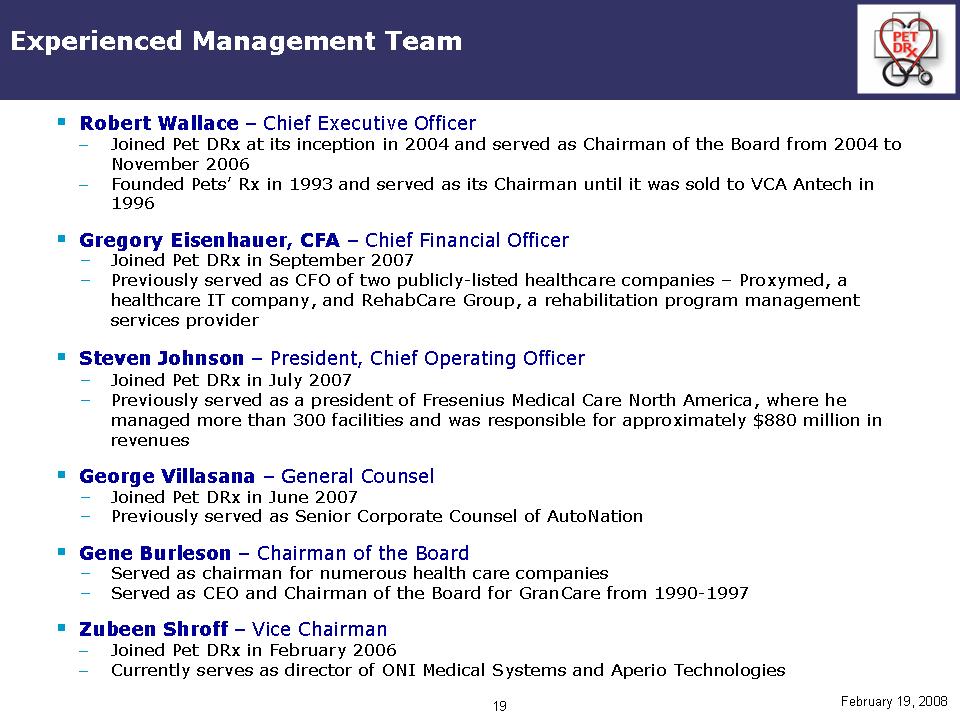
Experienced Management Team
. Robert Wallace – Chief Executive Officer
– Joined Pet DRx at its inception in 2004 and served as Chairman of the Board from 2004 to November 2006
– Founded Pets’ Rx in 1993 and served as its Chairman until it was sold to VCA Antech in 1996
. Gregory Eisenhauer, CFA – Chief Financial Officer
- Joined Pet DRx in September 2007
- Previously served as CFO of two publicly-listed healthcare companies – Proxymed, a healthcare IT company, and RehabCare Group,
a rehabilitation program management services provider
. Steven Johnson – President, Chief Operating Officer
- Joined Pet DRx in July 2007
- Previously served as a president of Fresenius Medical Care North America, where he managed more than 300 facilities and was
responsible for approximately $880 million in revenues
. George Villasana – General Counsel
- Joined Pet DRx in June 2007
- Previously served as Senior Corporate Counsel of AutoNation
. Gene Burleson – Chairman of the Board
- Served as chairman for numerous health care companies
- Served as CEO and Chairman of the Board for GranCare from 1990-1997
. Zubeen Shroff – Vice Chairman
– Joined Pet DRx in February 2006
– Currently serves as director of ONI Medical Systems and Aperio Technologies
February 19, 2008
19

Financial Review – Pet DRx Historical Growth
Pet DRx Consolidated Actual and Pro Forma Annual Revenue
12 Mo. % Revenue Growth
Pet DRx Average Annual Facility Revenue Growth (By Year Acquired)
Revenue ($MMs)
$80 $70.3 $60 $52.9 $40 $17.4 $20 $4.7 $0.7 $ –
2004 Actual 2005 Actual 2006 Actual 2006 PF 9M ’07 PF
14% 12% 10% 8% 6% 4% 2% 13.1%
First 12 Months Post Acquisition
11.7% 6.2%
2004 Facilities(1) 2005 Facilities(2) 2006 Facilities(3)
(1) Represents average revenue growth rate for 12 month period following the date of acquisition for each of the two facilities acquired in 2004.
(2) Represents average revenue growth rate for 12 month period following the date of acquisition for each of the four facilities acquired in 2005.
(3) Represents average revenue growth rate for 12 month period following the date of acquisition for each of the three facilities acquired
prior to July 1, 2006.
February 19, 2008
21

Financial Review – Foundation for Growth
While Pet DRx is currently building a dynamic veterinary industry platform, it is only three years old.
– At the end of the first quarter of 2006, Pet DRx operated just six facilities which generated approximately $2.7 million of revenue during the
first quarter of 2006, and was staffed accordingly
– Since then, Pet DRx has grown at an incredible pace, and now owns 26 facilities generating approximately $70 million in pro forma 2006 revenue
• Pet DRx has achieved this without a corporate acquisition and integration team, and with a limited operations and finance team
• The Company has brought on an experienced team with extensive experience in anticipation of continued rapid growth, but the benefit of these
personnel are not reflected in the recently reported results
– The Pet DRx year-to-date financial results include significant transaction and integration expenses that are not representative of future
operating performance
February 19, 2008
22
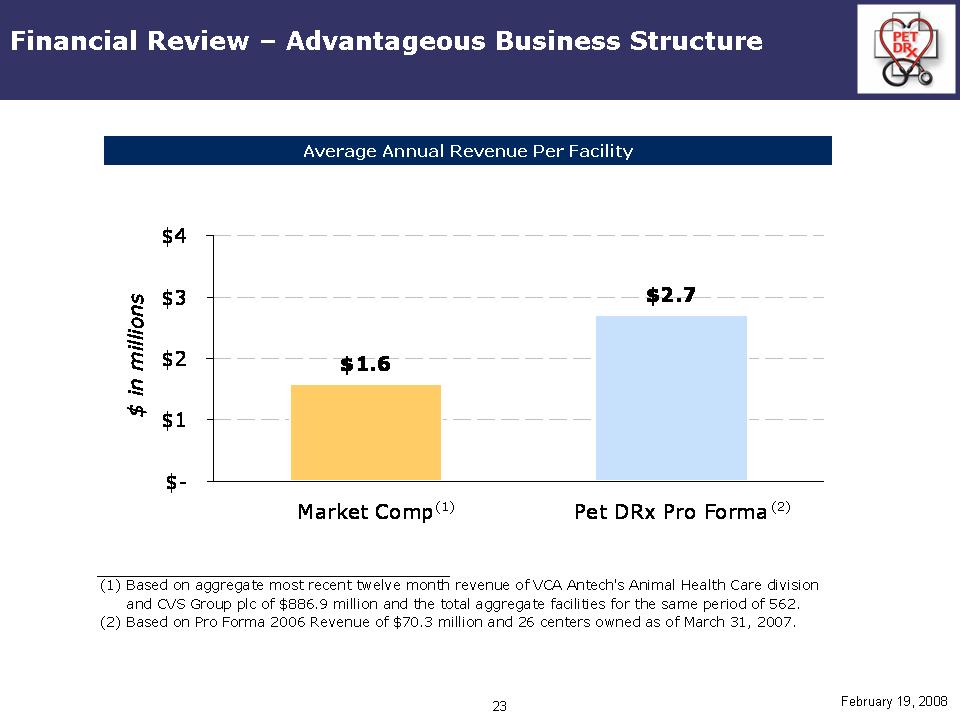
Financial Review – Advantageous Business Structure
Average Annual Revenue Per Facility
$ in millions
$4 $3 $2 $1 $-
$1.6 $2.7
Market Comp(1) Pet DRx Pro Forma(2)
(1) Based on aggregate most recent twelve month revenue of VCA Antech's Animal Health Care division and CVS Group plc of $886.9 million
and the total aggregate facilities for the same period of 562.
(2) Based on Pro Forma 2006 Revenue of $70.3 million and 26 centers owned as of March 31, 2007.
February 19, 2008
23

Financial Review – Business Improvement Opportunities
Cash from the merger provides Pet DRx with the resources to approximately double in size
– Recently recruited operations team will help expand beyond "low hanging fruit"
opportunities, including integration of new technology and the elimination of small
economic scale inefficiencies as clusters consolidate operations
– Pet DRx new integration teams should enable earlier implementation of operational improvements
– A permanent finance team is in place, replacing the more costly and less efficient temporary staff
– The completion of the audits and merger eliminates significant one time expenses
– The success in acquiring high profile practices has led to the establishment of
programs that will enhance care and customer’s loyalty and experience
February 19, 2008
24
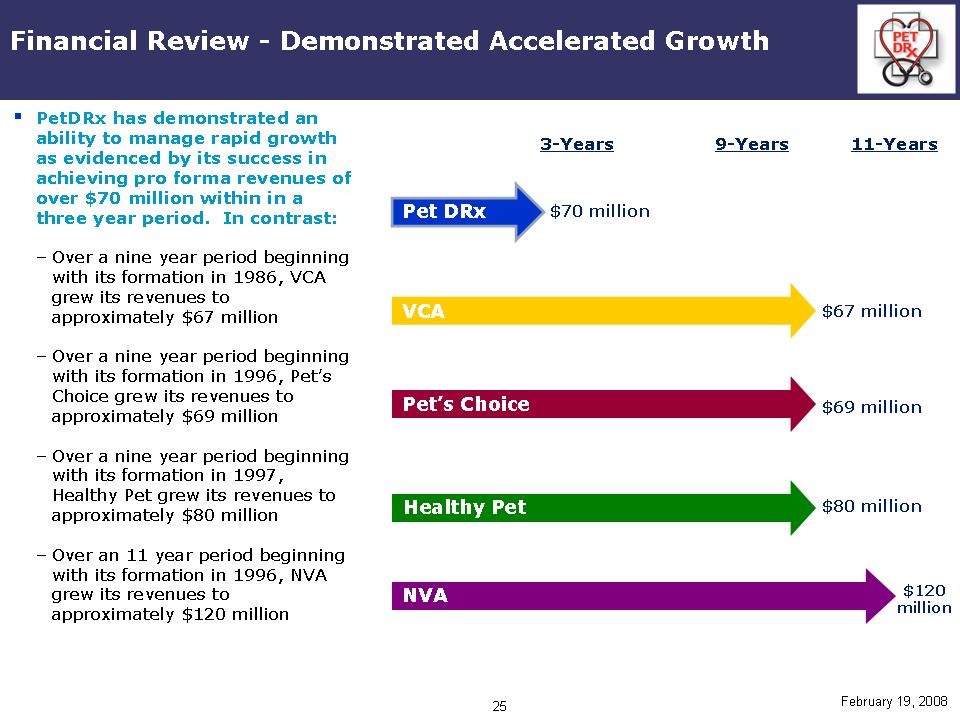
Financial Review -Demonstrated Accelerated Growth
PetDRx has demonstrated an
ability to manage rapid growth
as evidenced by its success in
achieving pro forma revenues of
over $70 million within in a
three year period. In contrast:
– Over a nine year period beginning with its formation in 1986, VCA grew its revenues to approximately $67 million
– Over a nine year period beginning with its formation in 1996, Pet’s Choice grew its revenues to approximately $69 million
– Over a nine year period beginning with its formation in 1997, Healthy Pet grew its revenues to approximately $80 million
– Over an 11 year period beginning with its formation in 1996, NVA grew its revenues to approximately $120 million
3-Years 9-Years 11-Years
$70 million $67 million $69 million $80 million $120 million
Pet DRx VCA Pet’s Choice Healthy Pet NVA
February 19, 2008
25

Financial Review – Pet DRx Operating Results
($ in thousands) Year Ended December 31, 2004 Actual (1) 2005 Actual 2006 Actual Pro Forma (2) 9 Months Ended 09/30/07 Pro Forma (2)
Revenues $ 660 $ 4,740 $ 17,442 $ 70,268 $ 52,864
Cost of sales 559 3,461 15,510 67,407 50,214
Gross profit 101 1,279 1,932 2,871 2,650
Operating income/(loss) (230) (1,034) (1,420) (1,828) (8,587)
Net income/(loss) $ (275) $ (1,310) $ (1,868) $ (4,352) $ (10,900)
Items Impacting Operating Profit/(Loss) and Net Loss:
Accounting and audit related fees $ -$ - -$ (585) $ (585) $ 2,863
Corporate payroll, inc. temps/consultants (113) (743) (1,244) (1,244) 2,479
Field staff costs - - (139) (139) 253
Interest and other income, net 8 14 527 2,321 1,833
Interest expense (52) (200) (950) (4,266) (3,312)
(1) Period from March 10, 2004 (inception) through December 31, 2004
(2) The Pro Forma adjustments give effect as if XLNT acquired these operations on January 1, 2006. In some instances where the
acquisition occurred December 31, 2006 or during 2007, the Pro Forma adjustment reflects the results of operations for a twelve month
period. Otherwise, the Pro forma adjustment reflects the results of operations from January 1 to the date of acquisition.
February 19, 2008
26
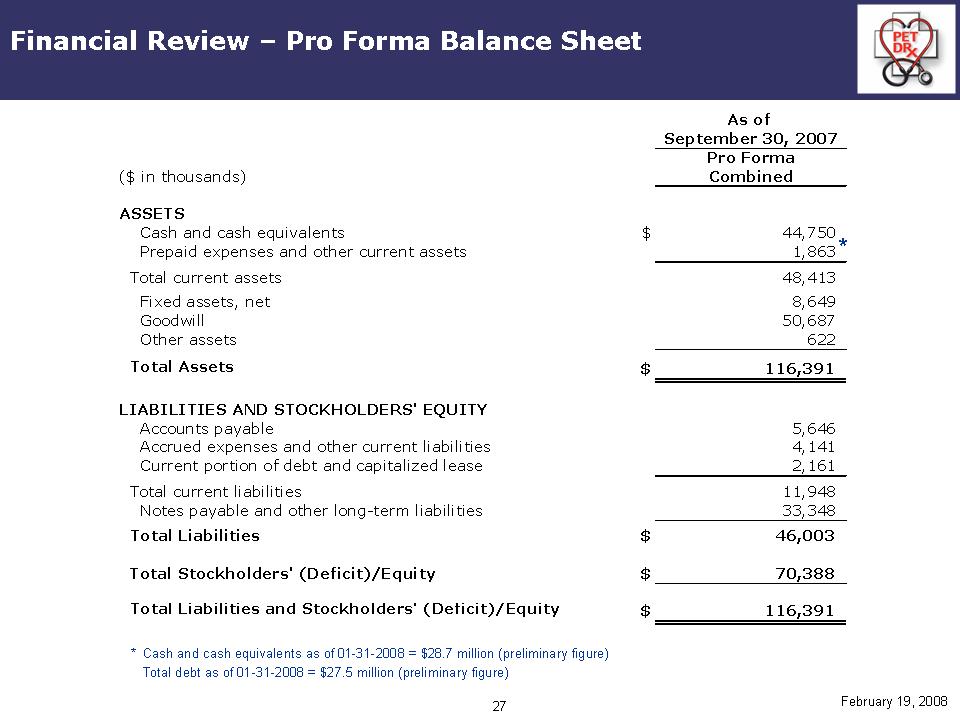
Financial Review – Pro Forma
($ in thousands) As of September 30, 2007 Pro Forma Combined
ASSETS
Cash and cash equivalents $ 44,750
Prepaid expenses and other current assets 1,863*
Total current assets 48,413
Fixed assets, net 8,649
Goodwill 50,687
Other assets 622
Total Assets $ 116,391
LIABILITIES AND STOCKHOLDERS' EQUITY
Accounts payable 5,646
Accrued expenses and other current liabilities 4,141
Current portion of debt and capitalized lease 2,161
Total current liabilities 11,948
Notes payable and other long-term liabilities 33,348
Total Liabilities $ 46,003
Total Stockholders' (Deficit)/Equity $ 70,388
Total Liabilities and Stockholders' (Deficit)/Equity $ 116,391
* Cash and cash equivalents as of 01-31-2008 = $28.7 million (preliminary figure)
Total debt as of 01-31-2008 = $27.5 million (preliminary figure)
February 19, 2008
27
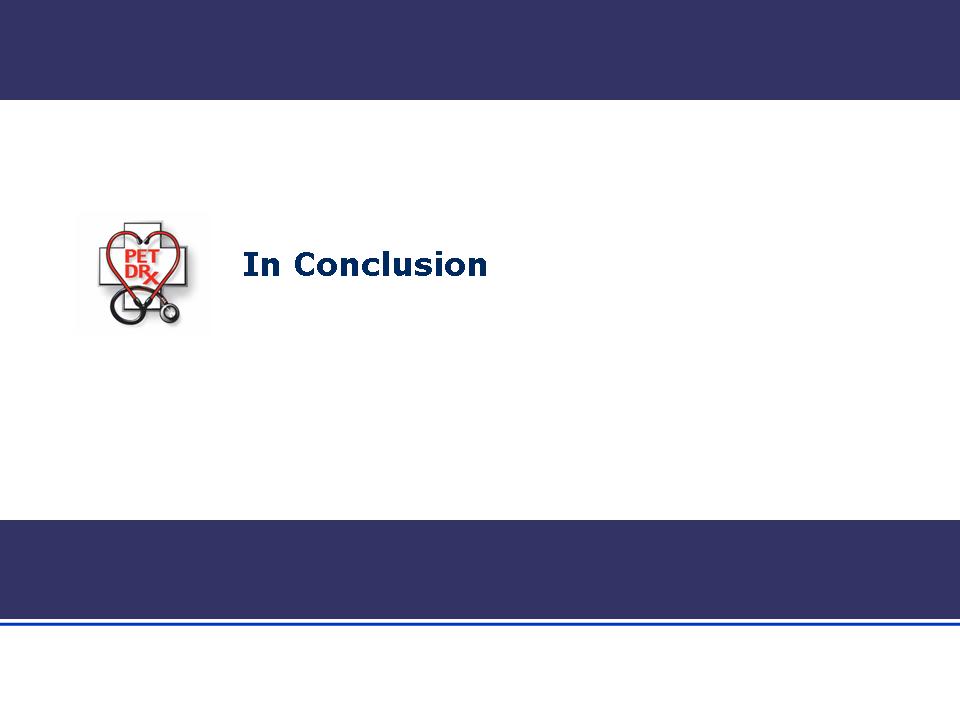
Capital Market Summary
Market/Symbol OTC: PDXC
Stock Price (as of 02-15-2008) $5.35
Shares Outstanding (as of 01-10-2008) 23,511,969
Market Capitalization ~$125.8 million
Cash (as of 01-31-2008) ~$28.7 million (preliminary figure)
Total Debt (as of 01-31-2008) ~$27.5 million (preliminary figure)
Fiscal Year-End December 31
February 19, 2008
29
Investment Summary
Operates in a large, growing fragmented market
-Strong industry fundamentals driving growth
-Industry essentially recession resistant
-Significant arbitrage between public and private market values
Well-established acquisition track record and critical mass
Unique, differentiated “Hub and Spoke” business model
Ample cash to drive the business forward
Experienced and incentivized management team, with similar consolidation strategy experience
Opportunity to enhance shareholder value
February 19, 2008
30
Pet DRx Corporation
www.petdrx.com
